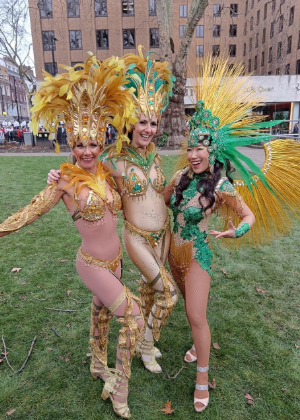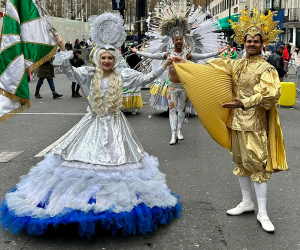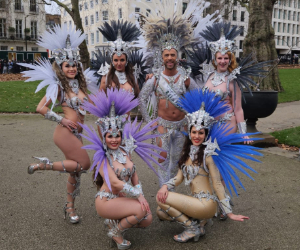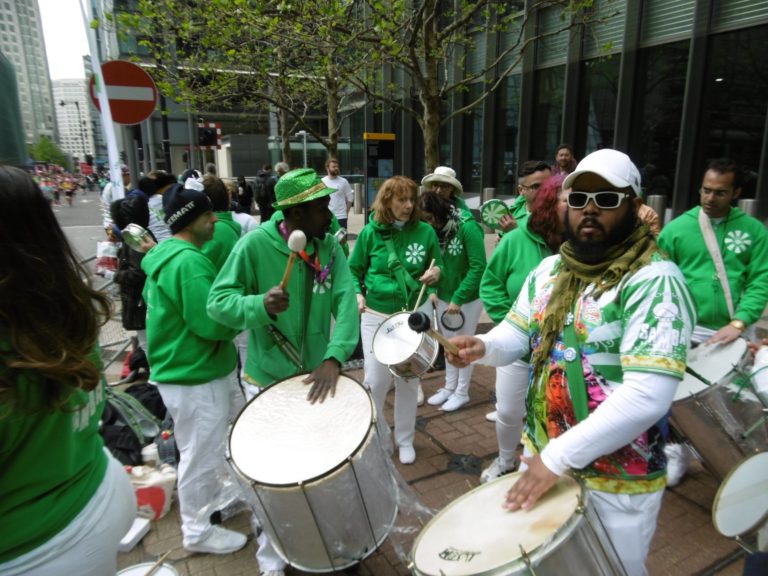History of Samba in the UK
from 1975 to 2020
This page tells the story of the history of Samba in the UK. One of the elements of Samba is to educate the next generation. They do this through storytelling and passing down the traditions of each School to the next generation. Mestre Mags of the London School of Samba wrote this chronology of Samba in the UK. It documents the growth of this music and how it has developed over the years.
Harold Wilson’s Labour Government grants political asylum to thousands of Chileans – some 4000 altogether of whom end up coming to the UK. They were forced to flee Chile following the bloody coup in 1973 that brought the US-backed dictator General Pinochet to power. Wilson’s government also gave political asylum to many other people whose countries were taken over or run by Military governments is this period – especially Brasilians, Argentineans, Colombians and South Africans. The arrival of such a large number of mainly Latin American citizens fleeing political persecution is the primary catalyst for the emergence of both Samba and Salsa in the UK.
Latin Percussionist Robin Jones has a small Samba group that played at the Lewisham Carnival. This group was with a “few people he was teaching in the UK”, including a Brasilian percussionist called Luis Jardin. There were no dancers in this group. They had also done an earlier performance at the Lord Mayor’s Show, but this was “not of any consequence”. They played Samba from a small float in a parade with a few ritmistas.
Alan Hayman from South Africa arrives in London. Pato and Carlos Fuentes arrive from Chile.
Robin Jones meets João Bosco de Oliveira (who had arrived from Brasil in 1978). This was when the show Brasil Tropical came back to London. The show had a performing group of some 40 Brasilians – but wanted more and decided to contact as many known Brazilian musicians in London. It would bring many people together, such as Bosco and Robin, who would, later on, form the first Samba School in the UK, the London School of Samba.
Roberta Pla, who arrived in the UK from Colombia in the same year, forms the first Salsa group in the UK, Valdez. He is also later one of the first members of the LSS. Pla said: “What we’re living now would have been a fantasy back then . . . . when l arrived in 1979, there were no venues, no Latin bands and no audiences for them.”
Robin Jones asked to produce a new show in London called Carnival Brasil. He asks Bosco to be the Musical Director. They went to France and played in the Fairfield Halls.
- Escola de Samba Mariposa on 10th January 1981 in Copenhagen, Denmark
- GRES. Samba Maracanã on 1st September 1981 in Lhati, Finland
- Escola de Samba Costa de Prata on 12th January 1982 in Ovar, Portugal
Alan Hayman begins searching for interested people to from a Samba School in London. He approaches Bosco at a gig in the Rockgarden, Covent Garden, asks him if he wants the Mestre for the first Samba School to be set up in the UK.
Formation of GRES. Unidos de Londres (The London School of Samba) by 12 musicians, 11 of whom are listed here: Alan Hayman, João Bosco de Oliveira, Dave Bitelli, Gerry Hunt, Hilton Leite, Dawson Miller, Dave Pattman, Liliana Chachian, Carlos Fuentes, Pato Fuentes, German Santana.
The LSS played their first gig in Covent Garden in April 1984. By 1986, over 500 drummers have performed with the School. LSS starts to perform all over the UK, inspiring groups such as the Inner Sense Percussion Orchestra.
The LSS became the first Samba School to perform at the Notting Hill Carnival with the theme and enredo called “Homage to Mocidade and Padre Miguel”. The School parades with around 50 drummers and 50 dancers in all Alas led by Celia Emony (Porta Bandeira), and Paulo Correa (Mestre Sala). The bateria is directed by João Bosco de Oliveira (Mestre da Bateria) with Shedar Baba (Puxador) and Marcelo “Tein” Ruas (Cavaco). Read about our very first appearance in 1984 at the Notting Hill Carnival.
- Formation of the 2nd Samba group in the UK: the Bristol School of Samba by Sam Alexander from the London School of Samba. LSS performs in Cardiff, Wales – the first Samba group to do so.
- First official recording of any Samba recording in the UK with the release of “Live at the Bass Clef” with one track by the LSS called “Batucada”.
- Around this time, South African exiles Alan Hayman and Steve Kitson and Chilean exile Pato Fuentes form the first political protest samba band – Batucada Mandela. They begin playing to support the nonstop 24h picket of the South African embassy in support of the ANC and the dismantling of apartheid.
- 1985/1986 Formation of Inner Sense Percussion. They join the LSS for the Notting Hill Carnival in 1986.
LSS win the Notting Hill Carnival for the first time. 1st European Samba Encontro in Uppsala, Sweden – organised by (amongst others) Åke Persson. Attended by many Swedish and Finnish Schools and the LSS led by Pato Fuentes.
2nd European Samba Encontro in Turku, Finland. Attended by many Swedish and Finnish Schools and the LSS.
Formation of Aquarela in Paris, France. Formation of Escola de Samba Macunaima in 1988 in Bordeaux, France. LSS performs in Edinburgh, Scotland for the first time. MacUmba was formed in Glasgow, Scotland.
3rd European Samba Encontro on the Southbank, London. Organised by Alan Hayman and the LSS. Attended by many European Samba Schools and from Brazil, Mocidade, the godmother of the LSS.
Formation of the first “political” samba group, Batucada Mandela. This new group was an offshoot of two other groups: The Inner London Anti-Apartheid Association and the Bateria of the LSS. Pato Fuentes, Alan Hayman and Steve Kitson were some of the main organisers of this group which played periodically for the release of Nelson Mandela outside the South African Embassy in Trafalgar Square.
Batucada Mandela plays on the Poll Tax march in London. The group continues to perform until the late 1990s (such as the London Dockers march in 1997).
1st UK Samba Encontro in Lincoln attended by the LSS, Inner Sense Percussion and a small number of other groups.
Formation of Bloco do Sul in Dorking by Mick Pyke and Sambuka in Hemel Hempstead by Bob Garland. Formation of Samba Galez in Wales.
LSS come third in the Notting Hill Carnival.
- 1st UK Samba Encontro in Lincoln attended by the LSS, Inner Sense Percussion and a small number of other groups.
- Formation of Bloco do Sul in Dorking by Mick Pyke and Sambuka in Hemel Hempstead by Bob Garland. Formation of Samba Galez in Wales.
LSS come third in the Notting Hill Carnival.
Formation of Quilombo do Samba (Gremio Recreativo Bloco Carnavalesco Quilombo do Samba) by Jimmy Rodrigues, who left the LSS that year. Also, a founder member of this group was another ex-LSS member, Tony Spiker. Joe Hanson (formerly of the Bristol School of Samba) would later by the Mestre of this group for five years. Also, a ritmista in this group is Giselle Winston, also ex-Bristol School of Samba. Quilombo first paraded in the Notting Hill Carnival in 1993.
- Formation of Escola de Samba Acadêmicos de Madureira by Alan Hayman. They parade every year at the Notting Hill Carnival until 1995, when Alan returns to Brazil. One of their dancers was Henrique da Silva – would later join the LSS before forming Paraiso in 2001. The Bateria director was Xavier Osmir – later Puxadore with the LSS.
- 1st International Samba Festival in Coburg, Germany
- Formation of Arco Iris in Cambridge with help from Dave Willetts, the Mestre of the LSS.
Formation of the Nottingham School of Samba by Tom Kemp from the LSS.
Formation of the Carnival Collective in Brighton. BAT2K formed in Southampton by Dave Renshaw. The Stroud School of Samba – an offshoot of the Bristol School of Samba is formed in Stroud. MaSamba School of Samba was formed in Dublin, Ireland. The Edinburgh Samba School (TESS) formed in Scotland. Samba Tawe was formed in Swansea, Wales.
Samba begins to take off in Wales: Powys School of Samba formed in Wales. Samba Bangor formed in Bangor, Gwynedd, Wales. Samba Dinbych started in Denbigh, Clwyd
- Formation of the Barking Bateria by Chris Knight and Lionel Sims – two drummers from the LSS who Batucada had greatly inspired Mandela on the Poll Tax March. A later offshoot of this group would by Rhythms of Resistance.
- Formation of Samba ya Bamba in Glasgow, Scotland in October
Formation of the Liverpool Samba School.
London School of Samba play at the Millennium Dome on New Years 2000 in front of the Queen and Prime Minister Tony Blair.
First visit by the LSS to the International Samba Festival in Coburg.
Formation of the Paraiso School of Samba by Henrique da Silva and his brother Mestre Esteves.
Bloco Liberdade – the successor group to Batucada Mandela – join the 1 million people demonstrating against the illegal war in Iraq with over 100 drummers.
Paraiso School of Samba win the Notting Hill Carnival for the first time.
Sambistas from the Paraiso School of Samba and London School of Samba perform at the opening ceremony of the 2012 London Olympics
Paraiso School of Samba win the Notting Hill Carnival for the second time.
Batala wins the Notting Hill Carnival for the first time.
London School of Samba win the Notting Hill Carnival for the second time.



Contact us to update the History of Samba in the UK page
London School of Samba Dance & Drum Classes
The London School of Samba have performed at many festivals, parades and of course the world-famous Notting Hill Carnivals over the years. Click to find out more about our samba dance classes in London. Our beginner’s samba drumming classes in London are a fun way to learn how to play music and make new friends. We love new members (especially beginners) and you don’t need to know how to dance or drum to join the London School of Samba!

